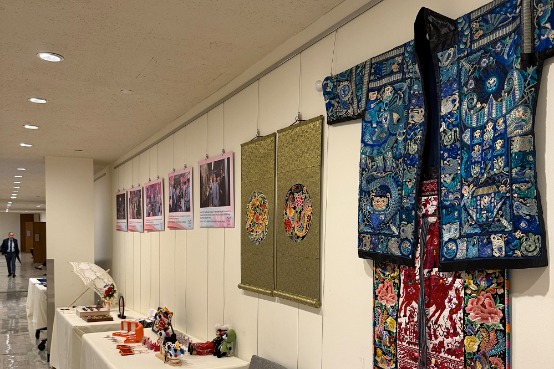China's mobile payment era: Costs and benefits

 |
| A foreigner scans the QR code to pay for snacks at a food stall in Hangzhou, the capital city of Zhejiang province, on April 14, 2017. [Photo/Xinhua] |
All vendors selling a range of produce at a marketplace in Luyuan community of Beijing's Xicheng district support mobile payments, and consumers can scan QR codes to pay through WeChat Wallet or Alipay.
A vendor, who sets up a stall in Luyuan community, said using mobile payments was not forced by the market regulator, but done voluntarily.
"All use, and if you did not use, it means a loss," the vendor said.
The popularity of mobile payments in China also shocked neighboring nation Japan, when an online post, recently published at a Japanese forum, stated a beggar even had to use the mobile payment QR code in China.
It has grown into a lifestyle choice of Chinese people using mobile payments throughout their daily activities and interactions, following the rapid development of mobile payment services led by third-party payment companies.
Mobile payments have not only become popular in large cities and urban areas, but also in the country's county towns and rural areas. Users prefer the services for convenience.
"It is troublesome to get lots of exchanges while buying vegetables, especially when dealing with coins, which are uneasy to carry," said a person who likes to use mobile payments.
Another mobile payment user said "the services, either WeChat Wallet or Alipay, will automatically record the trades, like an account book, which helps to know where money has gone every month."
According to internet research company iResearch, the market of mobile payments reached 38 trillion yuan ($5.5 trillion) in 2016, about 50 times the US market which saw $112 billion.
Alipay, the digital wallet run by e-commerce giant Alibaba Group, occupied 54 percent of the Chinese market, and WeChat Wallet owned, by Tencent Holdings, had 37 percent. Other third-party companies shared the percentage remainder.
Li Yi, a researcher from the Internet Society of China, said the rapid development of mobile payments in China was due to the weak sense of service in Chinese banks.
"Globally, places have weak traditional financial systems, and mobile payments and other non-cash payments are more developed," he said.
"For example, Kenya also has a high popularity of mobile payments."
The popularity of digital payments, however, has a potential risk in data privacy and financial security. To combat this, the Chinese government has issued regulations.
Ye Wentian, a researcher at the Ant Financial Business School, reminded users to refrain from scanning QR codes from unknown sources, which might be inset with viruses.
He added people should raise awareness of fraudulence, such as refund claims asking users to transfer or scan QR codes.
- China earmarks 40m yuan for provinces' disaster response as typhoon hits
- Two dead in Guangxi mudslides, rescue operations continue
- Researchers launch clinical trial for invasive brain-computer interface
- Kazakh youths embrace e-commerce
- China steps up preparations for Typhoon Wutip
- Exhibition highlights Yangtze River's influence on Chinese civilization





































